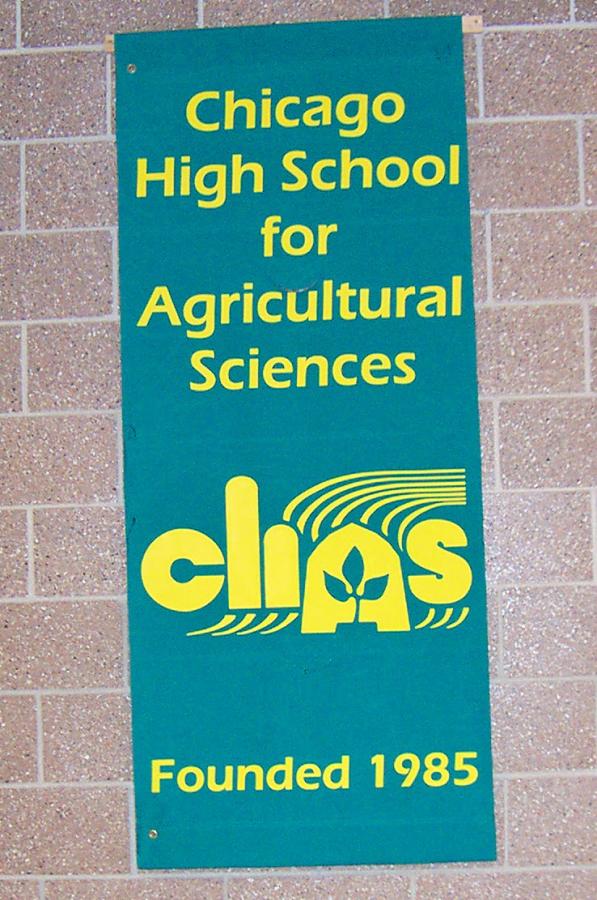It takes more than a fabulous crop of sweet corn to define the Chicago High School for Agricultural Sciences on the city's Southwest Side. That success this August, however, is just one example of teen talent, adult leadership and community at the school campus, a 75-acre working farm.
Work-based learning and specific career pathways (animal science, food science, horticulture, agriculture finance and economics, mechanical technology) are provided for the students at the magnet school that offers curriculum centered on agriculture and attracts students from throughout the city. Last year, enrollment was 587.
Urban students who are talented in mathematics and science have been enrolling at the CHSAS since in opened in September 1985. The school's mission weaves together career and global awareness, the economy and partnerships.
Visit the school's student-staffed farm stand and find the crops grown, priced, picked, displayed, and sold by students.
On a recent Monday morning, Delandre Dennis delivered an armful of squash to the stand. He exchanged information with Nia Robertson, a mechanical tech junior working the register. Then he volunteered to provide a tour.
He admits he did not initially enroll at the school filled with enthusiasm for agriculture. His transformation surprises even him. Dennis enters his senior year in agricultural finance this fall. He knows and boasts of nearly every inch of the school. 
Guiding, harvesting, pricing and talking about agriculture are second nature for the young man who commutes 45 minutes to Chicago Ag. He is one of 30 students paid to work there during the summer. Others work at neighboring Mount Greenwood Park and between 70 and 100 students volunteer through the Future Farmers Association.
Chicago Ag has Illinois's largest chapter of the Future Farmers of America and the nation's fifth largest chapter. Every student takes part in the agricultural education activities including career development events and supervised agricultural experiences.
Dennis says mechanical technology students built all the boards and crates for the farm stand. Gourd bird houses are made by students. Pesto sauce and zucchini bread are cooked by the food science crew. The special education students make and decorate the flower pots and care for all the plants inside the school. Students in the classroom for multiple handicaps make and sell dog biscuits, "Dog Gone Delights."
Because the school has an external partnership with Eli's Cheesecake Company, many students have had a chance to visit the factory. The connection is honey harvested from Chicago Ag hives for a special cheesecake.
When Dennis talks about food science equipment, he is proud to say the mixers are "not as big as Kraft's, but bigger than what is at home."
He also talks about the annual Harvest Festival and the day each year when everyone in the school gleans the fields to pick and collect pumpkins - a big seller.
In a greenhouse, he demonstrates the cover of dark curtains used when nurturing the poinsettias grown and sold at CHSAS. These students enter contests and flower and garden shows during which they compete successfully with professionals. They also do all the floral arrangements for school banquets and for graduation annually.
"One farmer, Mr. Nelson, runs the farm with all this help," Dennis explains.
Yes, there are cows, sheep, pigs and a horse. The chickens (and eggs) are organic. A veterinarian works there full time. Some students clean the barn and others constructed the chicken coop. Tilapia are raised. Fish poop fertilizes some of the plants. Mechanical tech students design new structures and the horticulture students maintain them.
Oh, and student horticulture specialists are working on a multi-year project on the back acres. It will be a five-hole public golf course with one hole to be reconfigured annually to keep the game fresh for golfers. The course is almost in Alsip, a suburban village whose northern edge borders Chicago. That village started as a farming area 175 years ago.
Demographics as of 2007 showed the school population to be 55% African American, 29.5% white and 11.6% Hispanic. Daily attendance measure 91.7% with a truancy rate of 0.2%.
Seventy-nine percent of its graduates enrolled in college or post-secondary education and 92% of the students report that there is a safe and respectful school climate. Honors and advanced placement courses are available.
Rick Johnson, an agriculture finance teacher, joined the school's faculty three years ago after 25 years working his way up and owning an urban agriculture business. He is adviser to the farm stand.
The school "gives kids opportunities to experience things that make them unique," he explains. Chicago Ag students are especially well-known to the country's land grant colleges, he said.